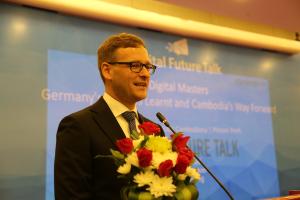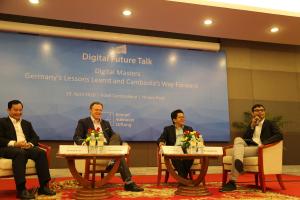With its first Digital Future Talk, Konrad-Adenauer-Stiftung Cambodia embarked in the digital environment and made the digital transformation a topic of discussion. In this regard, digital economies were not perceived as phenomena limited to geographical areas, like the Silicon Valley, Singapore or Shenzhen, but rather as phenomena spread over all continents and transcending the traditional boarders of doing business and managing things. Hand in hand with cross boarder data exchange and new ways of organizing society by using cloud systems and platforms, challenges and opportunities for multiple stakeholders rise.
Also in Cambodia, digital and mobile technology advances have delivered far-reaching economic and social benefits for companies and citizens. However, such development gains are far from automatic, and there are certain development challenges associated with the evolution of digitalization. In Cambodia, one can observe the increase of internet usage, the development of apps and other technologies. People start to flock together in modern and innovative co-working spaces, supported by private sector, state as well as international organizations. Diverse sectors, predominantly education, finance and transport, get disrupted by new inventions day by day. On the other hand, automatization may have certain impacts on Cambodian key industries, such as the garment and health industry, and may benefit primarily highly skilled and educated people.
The first Digital Future Talk was dedicated to have a closer look at challenges and opportunities related to an ongoing transformation of economies, government institutions and private households on a macro level. It was opened by Prof. Dr. Mario Voigt, Member of State Parliament Thuringia and Professor at the Quadriga University Berlin. In the course of his presentation he directly pointed out the tectonical shift within the global economy and illustrated with the help of data how the online consumption and usage of digital tools, platforms and apps increased. Advanced analytics, the Internet of Things, artificial intelligence, robotics and other major developments will shape behavior, on the lowest, and international relations, on the highest level. Following the description of major trends, he also pointed out the relevance of a strong regulatory framework to guarantee a fair competition within the specific markets as extended connectivity may affect the relations between suppliers, manufacturers and customers. He closed his presentation with the quote that everything, which can be digitized, will be digitized.
The presentation was followed by a short trigger presentation focusing on the current status of Cambodia’s digital economy by Dr. Pheakdey Heng, the moderator of the subsequent panel discussion. Mr. Rapid Sun, Vice President of the National Institute of Posts, Telecommunications and Information and Communication Technologies, Mr. Chanda Pen, Chief Executive Officer of Bongloy Payments and Prof. Dr. Mario Voigt participated in the panel discussion. All of the speakers shared and addressed the relevance of a sound regulatory framework to embrace technological developments and applications, especially in favor of SMEs. Furthermore, they agreed on the need of data security and efficient no one will be left behind policies. Consequently, Mr. Rapid Sun elaborated on the existing government policies, initiatives and goals, in particular on the ambitious goal of being a digital economy as of 2023. On the other hand, Mr. Chanda Pen provided insights in the sector and future of online payment systems and built the bridge between increasing cashless money transfers and data security. The discussion was wrapped up by a Q&A and open discussion among the panel and participants.





